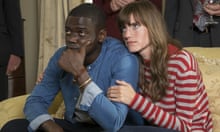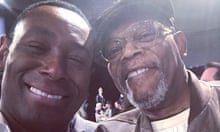Samuel L Jackson’s critique of black British actors taking US roles has sparked a heated debate in Hollywood where African American performers said the hiring of UK talent is another form of industry discrimination they face on a regular basis.
Jackson argued that Get Out, Jordan Peele’s satirical horror film about racism in liberal suburbs, could have been better with an American in the leading role, instead of British actor Daniel Kaluuya. “I tend to wonder what that movie would have been with an American brother who really feels that,” he told a New York radio station.
Though some have criticized Jackson’s comments – including John Boyega, the British Star Wars actor who called it a “stupid ass conflict we don’t have time for” – black actors in Los Angeles said it has sparked an important conversation and that they were tired of seeing UK actors taking on roles about the black American experience.
“When it comes to telling very specific American stories, it can sometimes feel like a slap in the face to the black community,” said Devere Rogers, a 29-year-old actor who has appeared in television shows Crazy Ex-Girlfriend and Grey’s Anatomy. “It’s like, we as Americans can’t tell our own stories?”
In addition to Get Out, Jackson cited Ava DuVernay’s historical drama Selma, which starred British actor David Oyelowo as Martin Luther King Jr, saying, “there are some brothers in America who could have been in that movie who would have had a different idea about how King thinks.”
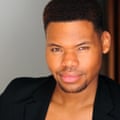
Naomie Harris, the Oscar-nominated star of Moonlight, is another British actor, who earned accolades for her portrayal of a single mother in Liberty City, Miami, who struggles with drug addiction. British actor Chiwetel Ejiofor also earned an Academy Award nomination for his depiction of a man sold into slavery in the film 12 Years a Slave, directed by Steve McQueen, who is also from the UK. Thandie Newton is another popular British actor who is currently starring in the American sci-fi thriller Westworld on HBO.
According to government data from 2013, there was a 500% increase in one year in approved visa petitions for UK actors and directors seeking to work in the US. Of the three Oscar-nominated films this year that focused on black stories, however, most of the stars were American actors.
Abraham Amkpa, an actor who has appeared on Agents of SHIELD, NCIS and The People v OJ Simpson, said he thought Kaluuya did a great job in Get Out, but that there are specific nuances an American actor might have brought to the film based on personal experiences.
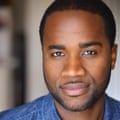
“There’s a very different shade of racism that exists in America,” said Amkpa, 29. “If it was an African American actor, I think it would’ve translated a bit more on the screen.”
When justifying the choice of hiring a British actor over an American, casting directors and film-makers sometimes cite the prestigious training in the UK at elite schools like the Royal Academy of Dramatic Art.
In an interview with the Observer, Peele said he wanted to hire an American but was so blown away by Kaluuya: “At the end of the day, he was the best person for the role. He did the audition and it was a slam dunk.”
In 2013, Spike Lee told the Guardian he wasn’t bothered by the trend of British actors taking American roles: “They’re well-trained. They came through on the stage not on a music video or whatever. So their acting’s impeccable and then they go into films.”
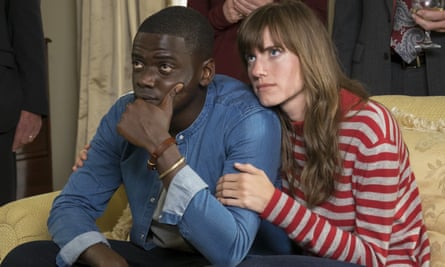
But for black actors and audiences, it can seem like highly trained and critically acclaimed British actors sometimes miss the mark in American narratives.
“There are times that I have watched certain British actors do roles where I feel like there is an authenticity missing,” said Stacy Amma Osei-Kuffour, an actor and playwright based in Los Angeles, who graduated from New York University Tisch School of the Arts. “There are ample American actors to play these parts.”
She noted that it’s much rarer for African American actors to land British roles, which can make the UK casting in the US even more discouraging.
Rogers said it can be frustrating to watch British actors give interviews about the extensive research and character work they did to prepare for a US role.
“For American actors, that’s already innately in us,” he said. “Especially with things like police brutality, how blacks are treated in America, that’s something we have to live with everyday.”
Dominique Toney, another Los Angeles-based actor and NYU graduate, said that black American actors are often forced to play stereotypes, which can make it harder for them to break out of typecasting in the future – and make it easier for British actors to land the more serious roles.
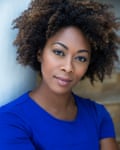
“We have to work. We do roles that probably pigeonhole us a little bit,” she said. “There are some tropes that we’ve seen throughout cinematic history with regards to black actors … Once you get into that pigeonhole, it’s hard to get out of it.”
African American films can suffer as a result, she said: “They’re missing out on the opportunity to cast actors who can pull from their own life experiences.”
Osei-Kuffour said she doesn’t feel like the debate about UK actors is the most pressing conversation about diversity in film, which has boiled over in recent years surrounding the #OscarsSoWhite controversy.
“When I see David Oyelowo in an American movie, I’m just happy black people are being represented,” she said.

